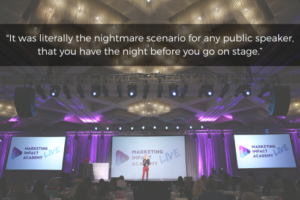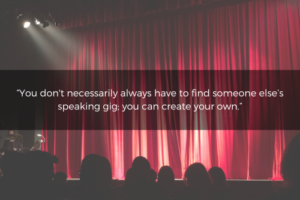What’s your biggest fear?
If you answered public speaking, you aren’t alone. It’s estimated that approximately 75% of the population experiences some degree of anxiety when it comes to speaking in front of an audience.
Don’t let that fear stand in your way…
Paid public speaking is a powerful tool for making connections, inspiring people, and education. Don’t worry if the idea of speaking in front of a crowd makes you sweat, this blog provides all the insider info you need to conquer that fear and start landing those high-paying speaking gigs.
Use these tips to establish your personal brand and kickstart your paid speaking career. We cover everything we’ve learned through personal experience, including those oh-so-humorous (but sometimes cringe-worthy) on-stage blunders and how to gracefully recover from them.

Concur your fear
Here’s the truth: public speaking really isn’t something to be afraid of. It’s a skill that can be mastered with practice, guidance, and the right mindset. Sure, there might be some nightmare moments where things go wrong, but guess what? There’s always a way to handle those challenges.
To prepare before going on stage..
- Practice deep breathing and relaxation techniques
- Visualize success and project confidence
- Rehearse multiple times
- Warm up your voice and body
- Research and understand your audience
A few common public speaking mistakes to avoid..
- Reading directly from notes or slides
- Speaking too quickly or slowly
- Overwhelming use of jargon
- Failure to adapt to time constraints
There are also several effective speaking techniques you can practice and utilize that will make you feel more comfortable on stage and help to captivate your audience…
Storytelling: Engage your audience by incorporating relevant and compelling stories into your speech. Stories create emotional connections, capture attention, and make your message more memorable.
Body Language: Pay attention to your body language, maintaining an open and confident posture. Use purposeful gestures to enhance your message and convey enthusiasm.
Eye Contact: Establish eye contact with individuals throughout your audience to create a sense of connection and engagement. It demonstrates confidence and helps build rapport with your listeners.
Vocal Varieties: Vary your tone, pitch, and pace to add emphasis, highlight important points, and maintain the audience’s interest. Incorporate pauses for impact and to allow the audience to absorb information.
Visual Aids: Utilize visual aids like slides or props to support and enhance your speech. Make sure they are clear, visually appealing, and reinforce your key points without overwhelming the audience.
Participation: Encourage audience participation through questions, interactive activities, or brief discussions. This involvement creates a more dynamic and memorable experience for everyone
Stay Authentic: Be yourself and let your personality shine through – authenticity builds trust and connection with the audience. Remind yourself of the importance of your message and the value it brings. When you shift the focus from your fears to the impact you can make, it becomes easier to overcome your fear of public speaking.
Most importantly…
Embrace Humor: Instead of letting your fear of public speaking consume you, use humor as a tool. Laughing off small mistakes or playfully acknowledging your nerves can help humanize you and create a stronger connection with your audience. It breaks down barriers and establishes a sense of camaraderie between you and your listeners. This connection creates a more relaxed and receptive environment, allowing your message to resonate more deeply.
Of course, always consider your audience and the context of your speech. Ensure that your jokes or humorous remarks align with the tone and purpose of your presentation.

Build your paid speaking career
Start small: Begin by speaking in front of smaller, supportive audiences or in low-pressure environments. Gradually increase the challenge as you gain confidence and experience.
Work for free: Offering your services for free as a public speaker is crucial for building experience, showcasing expertise, expanding your network, and generating word-of-mouth referrals. Platforms like Zoom enhance these benefits by reaching a global audience, overcoming logistical challenges, and developing virtual presentation skills.
Define your niche: Establishing a clear niche is essential for becoming a successful paid public speaker. By narrowing down your expertise and identifying a specific area or target audience, you differentiate yourself, attract the right opportunities, and position yourself as an expert in your field.
Record a podcast: Creating long-form content, like podcasts and YouTube videos, is key to building an impressive paid speaking resume. It’s a fantastic way to show off your speaking abilities, expand visibility, and establish your personal brand. These platforms serve as solid proof of your expertise, communication skills, and ability to engage an audience, making you an attractive choice for event organizers looking for experienced and dynamic speakers.
Do your research: To find speaking opportunities aligned with your expertise, you have to become a detective. Identify organizations representing your target audience and then research conferences and events where paid speakers are sought. Utilize Google and social media to track them down, engage with them, and offer your services tailored to their team’s specific needs. Being proactive will lead you to valuable speaking opportunities and connections.
You might be surprised to learn that even as professional speakers, Brock and I still have embarrassing moments on stage. Listen to the podcast for our juiciest stories – let’s just say I had a major wardrobe malfunction – and tips to overcome your fear of public speaking.
Here’s why you want to listen to episode #696 – How to be a Paid Speaker
- Brock and Chalene’s nightmare public speaking stories
- Advice for what to do when things go wrong on stage
- Brief descriptions of different types of public speaking
- First steps to becoming a paid speaker
- The value of working for free
- Tools for creating your own speaking opportunities
- How to build your public speaking resume
Comment below and let us know your best public speaking stories and tips…
Check out the following links for more information and tips on paid and public speaking…
BYT #604 – How to Get Started as an Expert Speaker
Public Speaking Tips | From the Stage to IG Live
BYT #472 – How to Stop Hating Your Speaking Voice and Improve Your On-Camera Presence
Don’t forget to subscribe to BYT for weekly shows dedicated to business growth and social media success!
We are also on YouTube! All our podcasts can be found in video form! Click here to subscribe.


